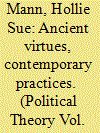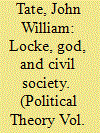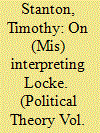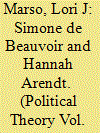| Srl | Item |
| 1 |
ID:
112367


|
|
|
|
|
| Publication |
2012.
|
| Summary/Abstract |
Earlier discussions of care have both insisted on its importance to political life and decried the unequal burden borne by women in care work. Yet they have failed to demonstrate why for reasons above and beyond the instrumental ends it serves. We ought to make the cultivation of an ongoing practice of caregiving a political priority. This article redefines and reframes care as a thoroughly critical and deeply embodied practice that is central to the flourishing of human beings. By way of Aristotle, I situate philia and embodied practices of care at the center of the shaping of the citizen and demonstrate a deeper significance of relations of care to our political life. When this is done alongside attention to habituation to right action and thinking, we can see more clearly how a particular kind of embodied politics can activate and sustain an ethic that cultivates citizens' capacities and desires to care.
|
|
|
|
|
|
|
|
|
|
|
|
|
|
|
|
| 2 |
ID:
112368


|
|
|
|
|
| Publication |
2012.
|
| Summary/Abstract |
Timothy Stanton is the latest in a line of Locke scholars who, in focusing on Locke's theological commitments, have sought to place these at the center of his political philosophy. Stanton insists that those who interpret Locke's political philosophy in more material terms, centered on individual liberty, government authority, and the need to reconcile both via consent, apply to it a misleading "picture" and fail to perceive its essentials. By showing that this is precisely how Locke himself intended his political philosophy to be understood, with the theology substantially removed, this article shows how Stanton is profoundly mistaken in his interpretation of Locke.
|
|
|
|
|
|
|
|
|
|
|
|
|
|
|
|
| 3 |
ID:
112369


|
|
|
| 4 |
ID:
112366


|
|
|
|
|
| Publication |
2012.
|
| Summary/Abstract |
This article compares Hannah Arendt's famous essay on Adolf Eichmann's trial in Israel in 1961 to Simone de Beauvoir's little studied piece, "An Eye for an Eye," on the trial of Robert Brasillach in France in 1945. Arendt and Beauvoir each determine the complicity of individuals acting within a political order that seeks to eliminate certain forms of otherness and difference, but come to differing conclusions about the significance of the crimes. I explain Beauvoir's account of ambiguity, on which she draws in her judgment of Brasillach and elaborates in her 1948 Ethics of Ambiguity, and measure it against Arendt's account of Eichmann's thoughtlessness and its effects on the destruction of conditions of worldly plurality. Linking the failure of ethical judgment on the part of individuals to prior systemic political conditions, Beauvoir helps us recognize struggles over the meaning of bodies and conditions of inequality as central to politics.
|
|
|
|
|
|
|
|
|
|
|
|
|
|
|
|
| 5 |
ID:
112365


|
|
|
|
|
| Publication |
2012.
|
| Summary/Abstract |
This essay explores letter writing in late ancien régime France as a means of political contestation. Drawing from Rancière's notion of "illegitimate speakers," I retrace the story of an obscure Bastille prisoner, Geneviève Gravelle, whose letters to the king and the French public reveal the simultaneously political, literary, and aesthetic barriers impeding such illegitimate speech and the strategies used in attempting to overcome them. Attending to the historical-poetic context in which Gravelle's letters were composed and circulated, I elaborate, first, a politics of voice that highlights the uncertain and multiply mediated processes on which political speech depends, and second, a politics of reading and writing in which sovereignty is both challenged and impersonated through the epistolary form.
|
|
|
|
|
|
|
|
|
|
|
|
|
|
|
|